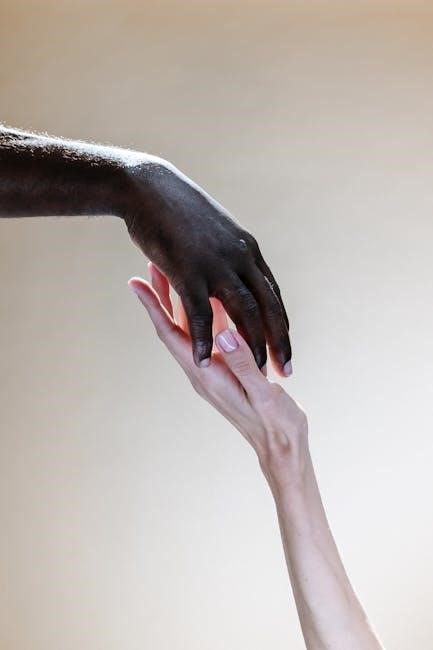This guide explores the complexities of black masculinity, offering insights into historical, cultural, and emotional dimensions to foster mutual respect and understanding in relationships.
Historical Context: The Evolution of Black Masculinity
The evolution of black masculinity is deeply rooted in historical struggles, from slavery to modern-day societal expectations. Black men have navigated systemic oppression, reshaping their identity to counter stereotypes. The Civil Rights Movement and Black Power era redefined black masculinity, emphasizing resilience and pride. Historical trauma has influenced how black men perceive themselves and their roles in relationships. Understanding this journey is crucial for bridging gaps in communication and fostering mutual respect. It highlights the resilience and adaptability of black men in the face of adversity.
Societal Expectations and Stereotypes
Society often imposes rigid expectations on black men, labeling them as “strong” or “tough,” while ignoring their vulnerability. Stereotypes like the “provider” or “protector” can create pressure to conform, limiting emotional expression. These narratives often oversimplify black masculinity, reducing it to archetypes rather than acknowledging its complexity. Understanding these societal constructs is key to dismantling misconceptions and fostering deeper connections. Recognizing the duality of strength and sensitivity can help bridge gaps in relationships and promote a more authentic understanding of black men.

Communication Styles: Bridging the Gap
Effective communication requires understanding emotional expression, active listening, and non-verbal cues, fostering mutual respect and empathy in relationships.
Verbal and Non-Verbal Cues in Relationships
Understanding verbal and non-verbal cues is crucial in relationships. Black men often use body language and tone to express emotions, while words may be less direct. Active listening and empathy bridge gaps, fostering trust. Recognizing these cues helps navigate misunderstandings and strengthens connections. Open dialogue about communication styles can deepen mutual understanding and respect, creating a more supportive partnership. Awareness of these elements is key to building harmony and intimacy in relationships.
The Role of Emotional Expression in Black Men
Emotional expression in black men is often shaped by societal expectations and historical trauma. Many black men are conditioned to suppress emotions, leading to internalized feelings and potential mental health challenges. This can create a sense of isolation or difficulty in forming intimate connections. Understanding this dynamic is key to fostering trust and emotional intimacy. Encouraging open dialogue and creating safe spaces for expression can help bridge this gap, promoting healthier relationships and emotional well-being. Recognizing these patterns is crucial for mutual growth and understanding.

Emotional and Mental Health
Emotional and mental health in black men is deeply influenced by societal pressures, trauma, and cultural norms. Encouraging open conversations and seeking support is vital for healing and growth.
Understanding the Impact of Trauma
Trauma profoundly shapes the emotional and mental landscape of black men, often stemming from historical oppression, systemic racism, and societal expectations. This can manifest as emotional numbness, anger, or withdrawal, impacting relationships and self-perception. The stigma surrounding mental health in the black community further complicates seeking help, perpetuating cycles of pain. Recognizing these patterns is crucial for fostering empathy and support. By acknowledging the depth of these wounds, black women can play a vital role in creating safe spaces for healing and open dialogue, helping to break generational cycles of trauma and rebuild emotional resilience.
Mental Health Stigmas in the Black Community
Mental health stigmas in the black community often stem from cultural beliefs, fear of judgment, and systemic racism. Many black men are discouraged from seeking help due to notions of “toughness” or “strength.” This reluctance perpetuates cycles of untreated mental health issues, worsening emotional and relational struggles. The stigma is deeply rooted in historical and societal contexts, making it challenging for black men to openly address their mental well-being. Black women can play a crucial role in fostering understanding and encouraging open conversations, helping to dismantle these barriers and promote healing.

Financial Responsibilities and Ambitions
Black men often shoulder significant financial responsibilities, driven by societal expectations and a desire to provide. These ambitions shape their identities and decisions, impacting relationships deeply.
The Provider Mentality in Black Men
The provider mentality is deeply ingrained in black men, often rooted in historical roles and societal expectations. It reflects a commitment to family and community, shaped by resilience and cultural values. This mindset can influence financial decisions, career choices, and personal identity, emphasizing the importance of support and responsibility. Understanding this perspective fosters empathy and collaboration in relationships, helping to bridge gaps in expectations and communication.
Economic Challenges and Their Effects on Relationships
Economic challenges can strain relationships, as financial stress impacts emotional well-being and communication. Black men often face systemic barriers, such as limited job opportunities and wage disparities, which can affect their ability to provide. These pressures may lead to tension, especially when societal expectations of the provider role are unmet. Open dialogue and mutual support are essential to navigate these issues, fostering understanding and strengthening the bond between partners.

Parenting and Family Dynamics
Black men play a vital role in family structures, often serving as pillars of strength and wisdom. Their involvement in parenting fosters resilience and cultural pride, enriching family bonds.
The Role of Fathers in the Black Family
Black fathers are crucial in shaping family values, offering guidance, and instilling cultural identity. Their presence fosters resilience and unity, often countering societal stereotypes. Through active involvement, they provide emotional and financial support, playing a pivotal role in their children’s development. Historically, despite challenges, Black fathers have been instrumental in preserving family traditions and ensuring the transmission of cultural heritage. Their contributions are vital, creating a strong foundation for future generations to thrive in an ever-changing world. Their impact is profound and enduring, shaping both individual and collective futures. Black fathers embody strength, wisdom, and unwavering commitment to their families. Their love and dedication are essential in nurturing a sense of belonging and pride among their children. By being present and engaged, they help build resilient family units that can navigate life’s challenges with confidence and unity. The role of Black fathers is not just biological; it is a cultural and emotional anchor that strengthens the entire community. Their influence extends beyond the home, contributing to the broader social fabric of the Black community. Through their leadership and care, they inspire and empower their children to embrace their identity and strive for excellence. The role of Black fathers is indispensable, fostering a legacy of love, strength, and perseverance that endures for generations.
Inter generational Lessons and Values
Inter generational lessons and values are vital in preserving cultural heritage and fostering resilience. Black men often pass down traditions, wisdom, and strength through storytelling and lived experiences. These teachings emphasize community, perseverance, and pride, helping navigate societal challenges. Historical trauma and collective struggles shape these values, creating a foundation for identity and unity. By honoring ancestors and embracing heritage, Black men instill a sense of purpose and belonging in their families. These lessons are not just about survival but also about thriving and building a legacy of cultural pride and strength.

Cultural Identity and Pride
Cultural identity is central to understanding Black men, rooted in heritage and tradition. Navigating racial identity in modern society fosters resilience and unity, celebrating their rich legacy.
The Importance of Heritage and Tradition
Heritage and tradition play a vital role in shaping the identity and resilience of Black men. Rooted in African customs and enriched by historical experiences, these elements foster pride and unity. Cultural practices, such as music, art, and storytelling, serve as a bridge to ancestral roots, preserving history and values. Understanding these traditions helps bridge gaps in relationships, highlighting the strength and richness of Black culture. Embracing heritage empowers Black men to honor their past while building a future grounded in shared identity and community bonds.
Navigating Racial Identity in Modern Society
Navigating racial identity in modern society presents unique challenges for Black men, who often face stereotypes and societal expectations. Historical trauma and systemic barriers shape their experiences, influencing self-perception and interactions. Black men must reconcile their heritage with contemporary norms, seeking to balance pride in their identity while addressing external pressures. Building mutual understanding involves acknowledging these complexities and fostering open dialogue about race, culture, and individuality. By doing so, relationships can become spaces of empathy and collaboration, bridging gaps and fostering collective growth.

Sexual Health and Intimacy
Open conversations about sexuality and intimacy are vital, fostering trust and mutual respect. Understanding emotional and cultural influences on sexual health strengthens connections and promotes healthier relationships.
Open Conversations About Sexuality
Open dialogues about sexuality foster trust and understanding, allowing both partners to express desires and boundaries. Cultural influences and societal norms often shape perspectives, requiring honest communication to navigate differences. By addressing misconceptions and embracing vulnerability, couples can build intimacy rooted in mutual respect. These conversations are not just about physical connection but also about emotional alignment, ensuring both individuals feel valued and heard in the relationship. Such openness strengthens bonds and creates a foundation for healthier, more fulfilling partnerships.
Building Trust and Intimacy in Relationships
Trust and intimacy are cornerstone of healthy relationships. Open communication fosters vulnerability, allowing partners to share emotions and desires without fear. Consistency and reliability strengthen bonds, creating a safe space for connection. Emotional availability and active listening deepen intimacy, while shared values and mutual respect further solidify trust. By prioritizing these elements, couples can build a foundation of understanding and empathy, leading to more fulfilling and enduring relationships.
Moving forward together requires collaboration, mutual respect, and a deep understanding of shared goals and challenges, fostering unity and empowerment in the journey ahead.
The Power of Mutual Understanding
Mutual understanding fosters empathy, bridging gaps between perspectives. By actively listening and valuing each other’s experiences, relationships deepen. Breaking down stereotypes and communication barriers strengthens trust. Open dialogue encourages vulnerability, creating safe spaces for growth. Shared goals and respect for individual journeys promote unity. Understanding each other’s struggles and triumphs builds resilience. Empathy and compassion pave the way for healing and collaboration. By embracing mutual understanding, partnerships flourish, leading to stronger, more supportive communities. This foundation is vital for overcoming challenges and achieving collective success.
Building a Supportive and Collaborative Future
Building a supportive and collaborative future requires intentional effort from both partners. Open dialogue and shared goals foster a strong foundation for mutual growth. By embracing each other’s strengths and weaknesses, relationships can thrive. Collaboration encourages teamwork, while respect for individuality ensures balance. Navigating challenges together strengthens resilience and trust. Creating a future rooted in understanding and empathy allows for a brighter, more harmonious path forward. This collective effort paves the way for lasting unity and prosperity, benefiting not just the individuals but the community at large.



